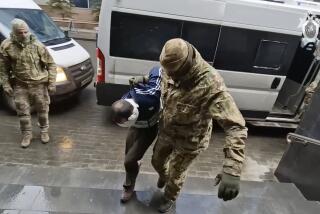Russians’ Influence Fades in Central Asia
- Share via
TASHKENT, Uzbekistan — The Soviet Union’s demise a decade ago sent ethnic Russians streaming out of Central Asia’s steppes, leaving behind war, shriveling salaries and neighbors suddenly resentful of their erstwhile colonizers.
But many more quietly stayed behind. Some couldn’t afford the journey to Russia. Others saw little point in leaving these sunnier lands they have called home all their lives for Russia’s frigid expanse.
An estimated 3 million to 4 million ethnic Russians live among the 55 million people in the five young Muslim nations of Central Asia, some anguished, some angry, some resigned, some resourceful. They are shaping a new role for themselves, coming to terms with depleted influence and security and the fading use of their native tongue.
Irina Prokofieva tutored generations of children in Russian verbs and Pushkin’s poetry in Uzbekistan’s capital, Tashkent. Her pension now is the equivalent of just $4 a month. She has no known relatives in Russia.
She has found a welcoming hearth in the city’s Orthodox Church, where she mops the marble floor, despite an ailing back, to supplement her income, and frequents a Sunday school prohibited by the atheist Soviet regime.
In Tajikistan’s capital, Dushanbe, three Russian women with Tajik husbands gather some afternoons on a park bench to share financial woes and debate how to school their bicultural children.
Nationalists in Russia, panicked by their country’s population decline since the Soviet collapse, are urging that these ethnic Russians be brought back “home.” But the government has exhibited no interest in a repatriation drive and little concern about the Russians who suddenly found themselves “abroad” in newly independent nations.
“We know not to expect anything from the Russian government. They don’t lift a finger,” said Sergei Ezhkov, an outspoken Russian journalist and activist in Uzbekistan who helped repatriate 5,000 fellow Russians in the early 1990s.
Some politicians in Moscow want Russians to stay in Central Asia. They fear the reduced Russian presence since 1991 has allowed the region to slip out of Moscow’s sphere of influence and into American hands.
Washington’s interest in the oil- and gas-rich region has led to aid and NATO exercises in Central Asia in recent years. In a sign of shifting allegiances, Uzbekistan, Kyrgyzstan and Tajikistan welcomed U.S. troops for the military operation in Afghanistan.
The countries’ impoverished governments hope the decision will endear them to Western investors. But Russian officials insist cooperation with Russia is the only salvation for Central Asia’s ailing economies.
“Russia is the key trade partner for Uzbekistan,” said Dmitry Ryurikov, Russia’s ambassador in Uzbekistan. “That is the reality.”
The Russians were the last in a long line of colonizers of the desert dunes that push east from the Caspian Sea into the towering Pamir Mountains.
Following Alexander the Great, Genghis Khan, British agents and czarist armies, Soviet planners drew today’s borders and “Russified” the countryside. More Russians arrived during mass deportations of political and other prisoners under Soviet dictator Josef Stalin.
Ezhkov’s ancestors came from Russia in 1874 to help build the region’s first railroad. A blue-eyed, fourth-generation Uzbekistan resident who punctuates his speech with Uzbek phrases, he sees little reason to leave.
Ezhkov is a muckraker and whistle-blower in a nation where criticizing the president can earn you a jail term. “They say I’m discrediting the country. But I’m doing it because I want to make the country better. It’s my country too,” he said.
Russians once ran most of Central Asia’s media, universities and factories. Fearing a backlash from native ethnic groups, an estimated 4 million have left since independence.
The exodus had a debilitating effect on the five countries’ economies, and locals started urging the remaining Russians to stay.
In Tajikistan, a five-year civil war and ensuing political chaos hastened the Russians’ departure--except for a 25,000-soldier Russian-led force that guards the border with Afghanistan, which the Tajik government is too destitute to patrol.
In Kyrgyzstan, the government tried to force civil servants to take Kyrgyz language exams. But acknowledging continued widespread Russian use, Parliament passed a law in December reviving it as an official language alongside Kyrgyz.
Russians have retained some government posts in Kazakstan, which shares a long border with Russia and where ethnic Kazaks form less than half the multicultural population.
Turkmenistan’s population is heavily Turkmen, and its authoritarian president’s anti-foreigner policies and struggle with Moscow over Caspian resources have alienated many ethnic Russians.
In Uzbekistan, dozens of people still cluster daily in a pothole-riddled residential area behind the Russian Embassy seeking Russian citizenship.
The numbers are down from the early 1990s. But 42,000 people remain on waiting lists for citizenship, said Ryurikov, the ambassador.
More to Read
Sign up for Essential California
The most important California stories and recommendations in your inbox every morning.
You may occasionally receive promotional content from the Los Angeles Times.













